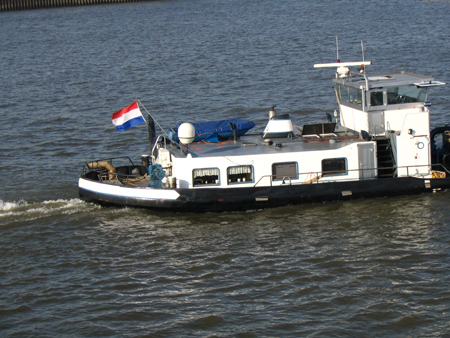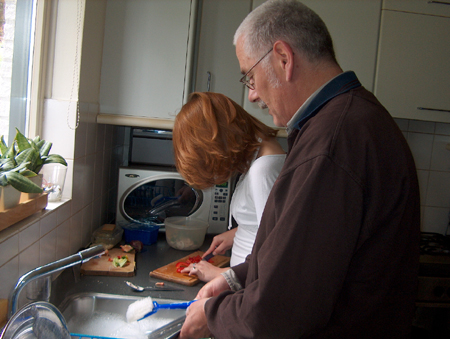
A
boat displays a Dutch flag the port of Rotterdam in the Netherlands.
Most Dutch people see the United Sates as extremely patriotic, while
the Dutch prefer to show their partriotism a little more quietly and
modestly.
June – 2005

A
boat displays a Dutch flag the port of Rotterdam in the Netherlands.
Most Dutch people see the United Sates as extremely patriotic, while
the Dutch prefer to show their partriotism a little more quietly and
modestly.
In the region, Dutchness finds its way into everyday life. The connections are there, whether it is family ties to the Netherlands, Dutch bakeries, or the annual Tulip Festival. Something that is seen much less often is the Dutch opinion of Americans.
After a time living in the Netherlands, I have gained perspective on the point of view the Dutch take when it comes to the big country that is always in the media, “Amerika.”
I have heard quite a bit from family, friends, and acquaintances during the year. Part of the goals of an exchange year, and something that happens quite naturally, is a comparison of cultures, sharing of opinions, and asking of questions. The majority of people I talk to are very curious about the U.S.
One of the highest points of America being on the Dutch mind was October/November of 2004. I only saw the 2004 elections from the east side of the Pacific, but it was a very significant issue and much-followed in the news. A huge deal.

Amy
Renes' host sister, Jet, and father, Wim Philipsen, prepare a meal.
Many of the conversations Amy has had with her host famliy about the
differences between the United States and Netherlands have taken
place in the kitchen washing dishes or cooking.
During the election, the Netherlands seemed to be a lot more in accord than the U.S. I found no one that thought Bush should win. People, just about everybody, asked me, “Bush or Kerry?” I usually scrounged around for some type of a diplomatic answer. Then, if I asked the question back, I was sure to get a “Kerry.”
One classmate gave me a mildly humorous, but slightly explicit opinion of Bush himself, while others gave the war in Iraq as a reason for the U.S. to switch leaders. I am not sure of all the exact reasons for Dutch political opinions. I have to admit that I am not one who can easily interpret politics. I could try but it could get messy. To me, politics seem messy enough, as it is.
Thankfully, politics were not the only thing in discussion during the year. Mostly random little conversations came up with friends or family, where the U.S. got pulled in. Sometimes good, sometimes bad, and sometimes comical.
Right now, I am not even sure which good points were discussed. The bad is always what sticks out in my mind the most. If something less than nice is said about your country, it is natural to be a little defensive and maybe even hurt. After awhile, I started to realize that those comments are never meant personally. You are always tied to your home country, but that does not force you to agree with or defend all of its actions or problems.
Problems aside, some pretty funny conversations can be had about the U.S. Most of the time, it is hilarious to see the misconceptions of the U.S. that come from “the realm of TV and movies.”
My whole family enjoys the show “Friends.” Of course, the coffee house is a regular setting for the show, and the cast always sips from coffee cups the size of mature pumpkins. My host mom assumed from the show that all Americans drink from giant coffee cups and later told me about it. I thought the connection she made was really amusing.
It was my friends’ turn to laugh when they found out that high school cheerleaders really do exist. “Do they have pom-pom’s and everything?” they asked me, barely believing their ears that the movies had it right with this American image.
Another stereotype that gets tossed around is overweight in the U.S. That is definitely a problem, but the situation in the Dutch mind is that Americans are all overweight because everyone eats at least two times a day at McDonald’s. I usually defend the U.S. on this point, saying that the two-times-a-day allegation is not true, while truly hoping that I am right. However, if I wanted to work offensively, I could bring up the point of how much the Dutch love their french fries, (which, FYI, is eaten with glops of mayonnaise.) I could do that, but it is not very polite.
It is not always necessary to be overly polite, but respect and understanding between countries goes a long way. Whatever the Dutch think of Americans, it varies greatly from person to person, as much as the amount of McDonalds eaten varies from American to American. In any case, I have learned a lot about the U.S. that I normally would not think about. I am glad to see a different perspective on my home country, in an unexpectedly efficient way. Leaving it.